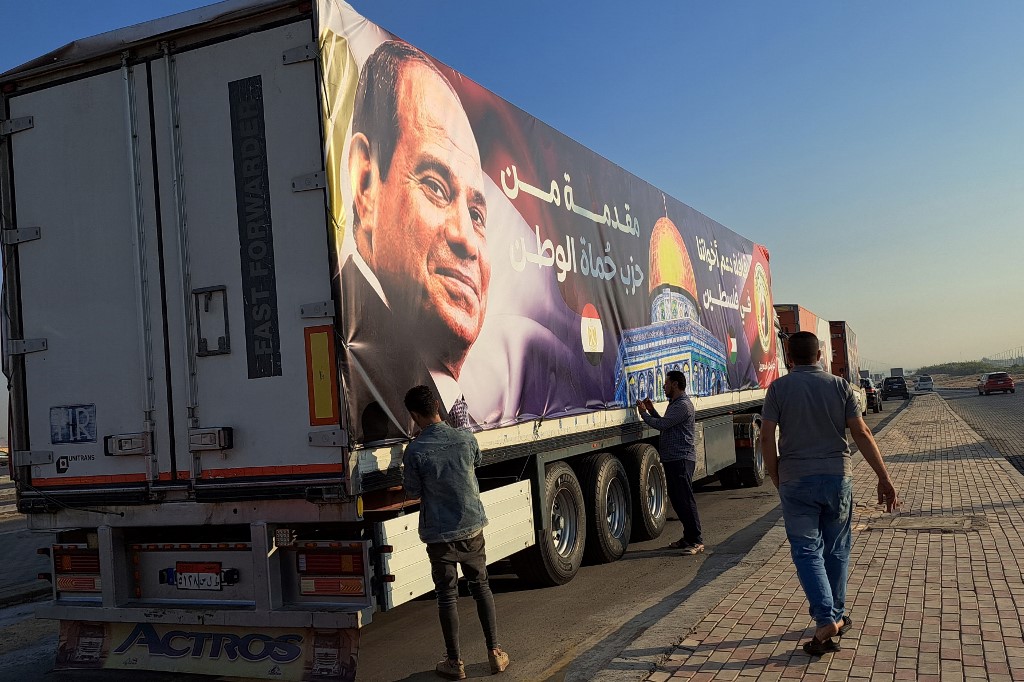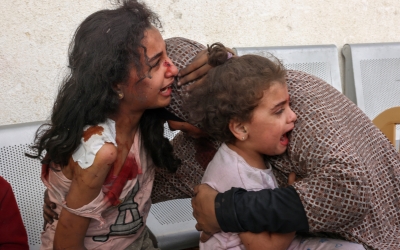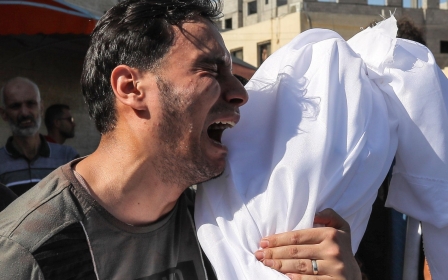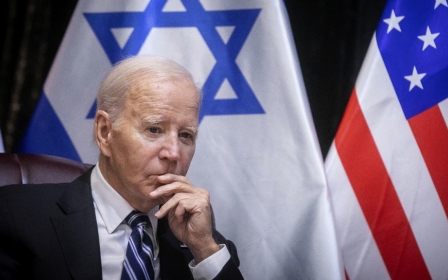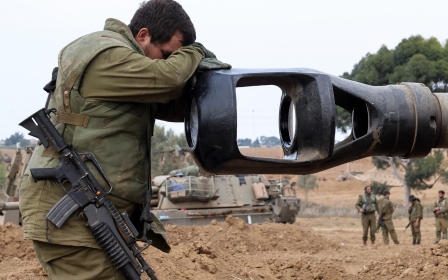Israel-Palestine war: Why Egypt's Sisi has to walk a tightrope
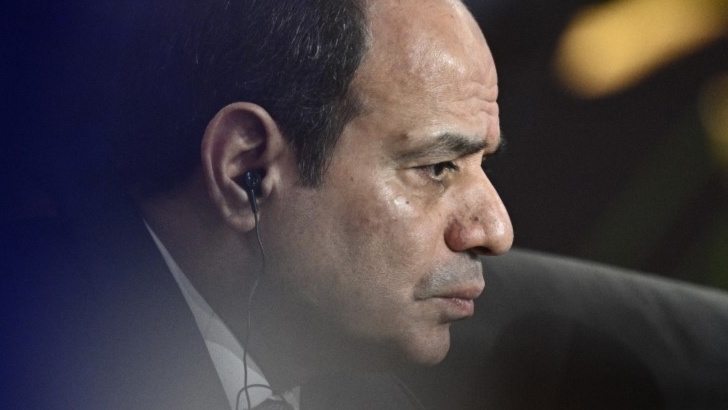
As the Israel-Palestine war grinds on, concerns have been rising in all the region’s capitals, most notably Cairo.
President Abdel Fattah el-Sisi, the military dictator who has ruled Egypt for the past decade, sees both positive opportunities and grave risks each time the Palestinian resistance confronts the Israeli occupation.
Since the reign of former presidents Anwar Sadat and Hosni Mubarak, Egypt has cemented its role as the enforcer of stability in the region in accordance with US interests, protecting the security of the state of Israel by ensuring no more wars are launched by conventional Arab armies, and mediating between the Israelis and Palestinians.
Such “mediation”, however - especially since Hamas took control of the Gaza Strip in 2007 - has effectively meant pressuring Palestinian resistance groups to de-escalate their operations or accept political compromises.
Cairo has used various cards to execute such plans, including security cooperation with Fatah and the Palestinian Authority and, more importantly, through managing the Rafah border crossing, Gaza’s only artery of life that is not under Tel Aviv’s control.
New MEE newsletter: Jerusalem Dispatch
Sign up to get the latest insights and analysis on Israel-Palestine, alongside Turkey Unpacked and other MEE newsletters
Cairo has hardly been a neutral mediator. The 2008 Gaza war was launched shortly after former Israeli foreign minister, Tzipi Livni, met Mubarak in Egypt. Mubarak participated in imposing the disastrous siege on Gaza, causing a severe humanitarian crisis, while Egyptian state officials and media have regularly criticised Hamas.
In the immediate aftermath of the 2013 coup, Egypt tightened the siege of Gaza, closing the Rafah crossing for extended periods of time. Highlighting the shared origins of Hamas and the Egyptian Muslim Brotherhood, the media alleged that the group was responsible for attacks against soldiers in the Sinai and other incidents, which the Palestinian group denied.
Oppression and resistance
The 2014 war on Gaza saw Egypt become fully complicit with Israel in working to wipe out Hamas, while imposing collective punishment on the Palestinian population of Gaza.
This stemmed from two main factors. The first is the tight alliance that emerged between Egypt and Israel after the coup, which saw Cairo allowing the Israeli Air Force to conduct secret strikes in the Sinai against alleged “terrorist” targets, and Israel intervening in the US on behalf of Egypt to unblock military aid.
Follow Middle East Eye's live coverage for the latest on the Israel-Palestine war
The second is Sisi’s onslaught against any cause adopted by revolutionaries during the 2011 uprising - and this is an issue that needs closer examination, since hope and despair, and oppression and resistance, are dialectically intertwined.
Egypt, even when organised dissent has been contained, is a powder keg ready to explode
The Palestinian cause has long been a key radicalising factor for generations of Egyptian youth, and their gateway to anti-regime dissent. While most literature on the 1968 global social movements tends to focus on the student and worker rebellions in the Global North, mass protests also took place in the Global South, including Egypt.
Partially disillusioned with former President Gamal Abdel Nasser after Egypt’s defeat in the 1967 war, the student movement was subsequently revived, demanding democratic reforms and asking to hold the army leadership accountable. The “third wave” of Egyptian communism was also launched in 1968.
Pro-Palestine activists on Egyptian university campuses were a crucial part of this new social movement, which climaxed with the 1977 “bread riots”, triggered by neoliberal decrees that removed subsidies from basic commodities. Sadat ultimately had to scrap that plan and send in the army to quell the uprising.
Controlling the Sinai
Decades later, the 2011 Egyptian uprising was the climax of a long process of dissent that started in 2000 with the outbreak of the Palestinian Second Intifada. The Egyptian regime, like the rest of the Arab regimes, paid nominal lip service to Palestinian rights while eyeing the armed and popular resistance as a source of instability, and a model that could be replicated by local dissidents.
Since 2017, however, Sisi’s animosity towards Hamas has gradually started shifting into a relative rapprochement. On the one hand, Hamas has proven to be resilient. On the other hand, facing casualties in fighting the Sinai insurgency, Egypt needed Hamas’s help to control the flow of insurgents and arms from Gaza, along with escape routes to Rafah.
The rapprochement included easing the siege, opening the Rafah crossing, and holding meetings with Hamas leaders in efforts to broker a long truce with Israel. The humanitarian situation in Gaza, however, did not substantially improve. Egypt’s foreign policy remained dependent on US guidelines, which reached new extremes under the Trump administration.
The election of President Joe Biden in 2020 inaugurated a new chapter for Egypt-Gaza relations. Prior to assuming office, Biden vowed to hold Trump’s “favourite dictator” accountable. Human rights rhetoric was a high priority in the Democratic Party, spearheaded by its “progressive” wing.
But the outbreak of the 2021 Gaza war proved a golden opportunity for Sisi to present himself as a credible “mediator” who could exert influence on Hamas while ensuring Israel’s security. Egypt managed to broker a ceasefire, earning the Biden administration’s praise.
Since then, Cairo has resumed its usual role, working towards de-escalation and ceasefires whenever tensions erupt between Israel and the Palestinians. In exchange, it scores political clout with Washington and other western capitals. Ensuring quiet has also meant using the Rafah crossing as a bargaining chip with Hamas, and passing on intelligence to Israel of imminent dangers.
Amid the current war, Sisi has had to walk a tightrope. He is offering himself to world leaders - some of whom have been critical of his human rights record - as a credible mediator trying to de-escalate. But at the same time, he is worried that a humanitarian disaster could force Palestinian refugees to relocate to Egypt, and risk sparking domestic political instability.
He publicly stated he rejected any proposal to transfer Palestinians to Sinai, and proposed instead they could be moved to the Negev Desert "until Israel accomplishes its stated mission to liquidate the resistance".
However, Mada Masr, a local independent media website, reported that there were ongoing negotiations where Cairo was near accepting the resettlement of Palestinians in the peninsula in exchange for financial incentives.
The site management took down the report later, citing "national security" concerns.
Risks of unrest
Yet, more dangerous for Sisi would be the potential domestic fallout, with Egyptians frustrated by deteriorating living standards and an economic crisis. Sisi’s victory in the upcoming presidential election, despite his plummeting popularity, is certain simply because the serious contenders have been eliminated, and state organs will mobilise on the autocrat’s behalf.
Spontaneous protests in solidarity with the Palestinians broke out over the past week, on university campuses, in professional syndicates, at mosques and some public squares. Such levels of mobilisation are unprecedented post-coup, and reminiscent of the 2000s, when the second Palestinian intifada revived street politics under Mubarak.
Since Wednesday, the state has been involved in some street actions, where civil servants were ordered by the authorities or mobilised by the security services-run Nation's Future Party to hold public gatherings, to support Sisi's "defiant stand in defence of Egypt's national security".
These mobilisations no doubt are trying to diffuse public anger that could develop into anti-regime protests. On the other hand, they can potentially help Sisi negotiate a better deal with Israel, if he accepts the resettlement plan or decides to kill it.
Still, the ongoing protests are normalising once again street politics. The country, even when organised dissent has been suppressed, is a powder keg ready to explode. Palestine could be a trigger, if the guns don’t swiftly fall silent.
The views expressed in this article belong to the author and do not necessarily reflect the editorial policy of Middle East Eye.
This article is available in French on Middle East Eye French edition.
Middle East Eye delivers independent and unrivalled coverage and analysis of the Middle East, North Africa and beyond. To learn more about republishing this content and the associated fees, please fill out this form. More about MEE can be found here.



